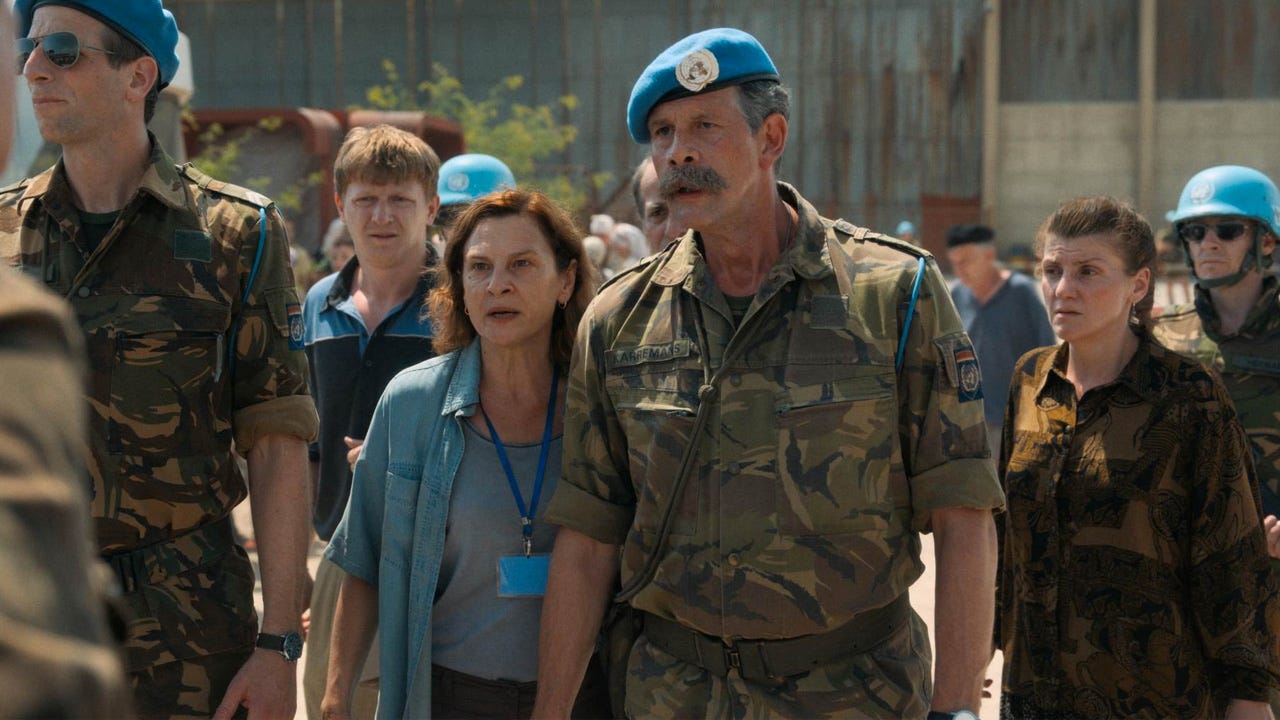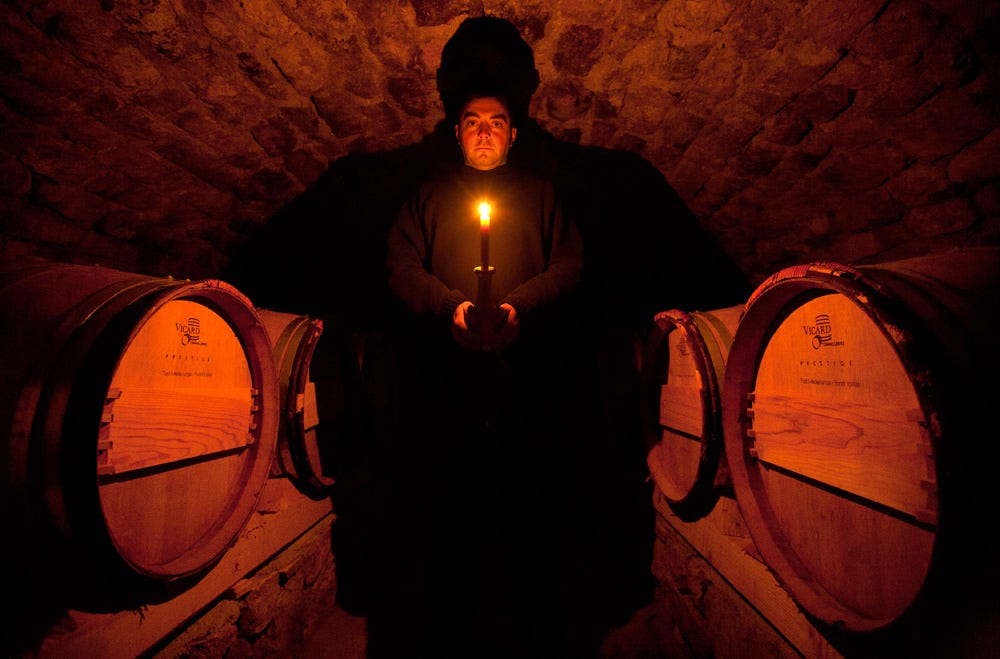XLIV. And the Oscar goes to...
20 years after the only Academy Award won by a Balkan film, "Quo Vadis, Aida?" (about the Srebrenica massacre) is in the running. You can watch it online for free thanks to the Sarajevo Film Festival
Hi,
welcome back to BarBalkans, the Italian newsletter whose aim is to give a voice to the Western Balkans’ stories, on the 30th anniversary of the Yugoslav Wars.
We are only a few hours away from one of the most awaited nights of the year, all over the world.
The red carpet night, the Dolby Theater night (the Kodak Theater, for the nostalgic people) in Hollywood.
The Oscar Night.
Scheduled for Sunday 25 April (at 5 p.m., Pacific Time), the 93rd Academy Awards will be special for many reasons.
First of all, for introducing remote connection for people who are not able to travel to Los Angeles, because for the COVID-19 pandemic.
But it will be special also for Europe.
20 years after the last (and only) triumph of the “Best Foreign Language Film” Award, a Bosnian film will try to bring the Academy’s Golden Statuette again to the Balkans.
And the Oscar goes to…
The underdog from Sarajevo
In 2021, three movies from Europe, one from Asia and one from Africa will contend for the Best Foreign Language Film Award at the Oscars:
Another Round (Denmark)
Collective (Romania)
Quo Vadis, Aida? (Bosnia and Herzegovina)
Better Days (Hong Kong)
The Man Who Sold His Skin (Tunisia)
The Danish Another Round is favored to win. But a Balkan underdog from Sarajevo is ready to do battle in Hollywood.
With no pressure to win at all costs, Quo Vadis, Aida? can reserve large surprises.
The film is the dramatic reconstruction of the story of a young Bosnian woman, a translator for the United Nations peacekeeping mission in her country.
The events are set during the Srebrenica massacre in July 1995.
Bosnia and Herzegovina, July 1995.
Aida is a translator for the United Nations in Potočari, five kilometers from Srebrenica. When the Serbian army takes control of the city, her family is among the thousands of citizens seeking refuge in the UN camp.
As a translator, Aida has access to crucial information. She will become aware of the destiny of her family and her fellow citizens.
Jasna Ðuričić plays the role of a woman struggling to save her husband and children. Aida runs incessantly, looking for a manager, an officer, a human being who could help to hide the men of her family.
«This film is about a woman caught in a male game of war. It is about courage, love and resilience, but also about what happens if we fail to react on time to warning signs. I survived the war in Bosnia. One day you have everything, and the other day most of the things you know no longer exist. Just because we deem certain things unimaginable, it doesn’t mean they cannot happen».
Jasmila Žbanić, director
Quo Vadis, Aida? is the fifth feature film by Jasmila Žbanić. The Bosnian director is also known for the movie Grbavica, that won the Golden Bear at the 56th Berlin International Film Festival.
Beyond the protagonist’s personal story, the director is able to show the essence of a genocide, even without a drop of blood or a scene of violence.
However, we can see the whole chain of responsibility for that tragedy. The political will, the abuses of the military and the general cowardice that allowed the massacre of 8,372 men in a few days.
The film shows these inextricable dynamics, the suffering, tensions and anguish that gradually materialize among civilians and within Aida’s family.
A suffocating density of emotions. There is no suspense, because History (even for people who were living it) has already been written.
The ending of the film is obvious, we can see it from the very first bars. And it could not be otherwise.
The movie is loosely based on the story of Hasan Nuhanović, translator for the Dutchbat III battalion of the United Nations Protection Force in Potočari.
On July 11, 1995, his parents and brother entered the UN base, feeling safe. Two days later, they came out in the hands of Serbian soldiers.
They were handed over by Dutch soldiers, who could not hide them or pass them off as employees of the United Nations.
The bodies of Ibro, Nasiha and Muhamed Nuhanović are buried in the Potočari memorial cemetery.
Hasan Nuhanović was a key-witness to understand the Srebrenica events, and in recent years he has worked closely with Jasmila Žbanić to write the screenplay of the film.
Hasan suggested that an actress should have played the character inspired by his story.
Quo Vadis, Aida? is a very subtle reminder that no effort is wasted when trying to prevent a tragedy from happening.
It is worth waiting until the end of the credits, when a group of men and women, dancing one last kolo in an eastern Bosnian bar, stare us in the eye.
And they seem to remind us of our passivity, our indifference towards violence.
Today as yesterday.
Don’t miss it
Waiting to find out if the underdog from Sarajevo will succeed in Hollywood, the capital of Bosnia and Herzegovina made us a gift.
Starting from today (April 24) to Friday 30 April, we can watch nine feature films and one short film in a free online format on the Sarajevo Film Festival website, including Quo Vadis, Aida?.
The ten films are part of the “Dealing with the Past” programme, in the 27th edition of one of the most important festivals in the region.
[If you want to know more, we talked about it with Nina Dumrukcic in the 23rd episode, Inspire like a girl, ep. 3]
The programme was launched in 2016 with the aim of initiating an honest dialogue about the recent past in the Balkans, thanks to films dealing with issues of conflict and reconciliation. As the SFF board explains:
«This is a prerequisite to overcome problems arising from the recent wars in former Yugoslavia, which irreparably marked our societies. In the past five years, we have shared many extremely painful, but inspiring stories from all over the world in this programme».
In addition to the Oscar nominated film, we can also watch:
The Diary of Diana B. (by Dana Budisavljević), a biopic about Diana Budisavljević and how she rescued more than 10 thousand children imprisoned in concentration camps during the World War II;
Srbenka (by Nebojša Slijepčević), the story of Aleksandra Zec, a Serbian girl killed in Zagreb in 1991;
The Load (by Ognjen Glavonić), a drama about a Serbian truck driver who receives money to move a truck with a mysterious load from Kosovo to Belgrade during the bombing of Yugoslavia in 1999;
The Painted Bird (by Václav Marhoul), a black and white movie that describes the World War II from the perspective of a boy;
Chris the Swiss (by Anja Kofmel), a documentary on the search for truth and the confrontation with the ghosts of the past;
Son of Saul (by László Nemes), tells the story of a Jewish worker who looks for a rabbi in the Auschwitz concentration camp to give a decent burial to a dead child;
Men Don’t Cry (by Alen Drljević), follows the confrontation among ten former soldiers from opposite sides, gathered in a hotel in Bosnia, 15 years after the war;
Yugoslavia: How Ideology Moved Our Collective Body (by Marta Popivoda), a research-based essay film that deals with the question of how ideology performs itself in public space through mass performances;
The Pit (by Alban Ukaj), a short film about three young independent directors who discover to be followed by a stranger while making a film about a war crime in Sarajevo.
A twenty-year dream
Twenty years have passed since March 25, 2001, when Danis Tanović’s No Man’s Land brought the Academy’s Golden Statuette to the Balkans for the first and only time.
A war film, with a comedy tone. The ridicule of an atrocious war.
During the 1993 war in Bosnia and Herzegovina, two soldiers from opposing sides - Bosnian Serb Nino and Bosniak Čiki - are trapped in a trench in no man’s land. A third soldier is lying on a land mine, which would explode at his slightest movement.
UN troops intervene, but they only create problems, in a war that is perceived as a ground for diplomatic exercises.
“Do you even know what is the difference between a pessimist and an optimist? A pessimist thinks things cannot be worse. An optimist knows they can”.
This joke summarizes this tragicomic and bitter film. Starting from the war in the former Yugoslavia, it becomes the paradigm for all contemporary wars.
Throughout its history, Yugoslavian movies managed to be nominated for 6 Academy Awards, between 1958 and 1985. But they never won the Golden Statuette for the Best Foreign Language Film Award.
In a timespan of 30 years since the dissolution of the Federation, the seven countries (plus Albania) have submitted 144 films to the jury.
However, before the 93rd Academy Awards, there were only 3 nominations. One for Bosnia and Herzegovina (at the famous 2001 edition) and two for North Macedonia (Before the Rain in 1994, Honeyland in 2019).
Quo Vadis, Aida? will try to attempt the feat.
Something that has already the taste of success, whatever it happens in Hollywood, on April 25.
Pit stop. Sittin’ at the BarBalkans
We have reached the end of this piece of road.
As we are talking about awards in Bosnia and Herzegovina, we have to try one of the best red wines of the region: the Velika Rezerva.
Produced in the 15th-century Serbian Orthodox monastery of Tvrdoš (close to Trebinje), this centuries-old wine won the gold medal in 2018 at the wine competition organized by Decanter, a famous wine magazine.
Velika Rezerva won over another 16,900 wines from all over the world, while the monastery’s Vranac and Hum-Cabernet Sauvignon won the bronze medal.
Tvrdoš monastery has two cellars.
The oldest cellar has stone walls and hosts centuries-old oak barrels.
The underground cellar is located near Trebišnjica river and contains modern production technologies.
This is all it takes to achieve global success and show the high quality of local products.
Let’s continue the BarBalkans journey. We’ll meet again in a week, for the 45th stop.
A big hug and have a good journey!
BarBalkans is a free weekly newsletter. Behind these contents there is a lot of work undertaken. If you want to help this project to improve, I kindly ask you to consider the possibility of donating. As a gift, every second Wednesday of the month you will receive a podcast with an article about the dissolution of Yugoslavia.
If you want a preview, just listen to BarBalkans - Podcast. You can find it on Spreaker and Spotify!
As always, I thank you for getting this far with me. If you are interested in the relationship between cinema and the Balkans, I recommend you this previous newsletter (while here you can find all the others):
If you want to help me to make this experience grow, you can invite whoever you want to subscribe to the newsletter:
Pay attention! The first time you will receive the newsletter, it may go to spam, or to “Promotions Tab”, if you use Gmail. Just move it to “Inbox” and, on the top of the e-mail, flag the specific option to receive the next ones there.
BarBalkans is on Facebook and Instagram, while on Linktree you can find the updated archive.








